A Film-Philosophy of Ecology and Enlightenment
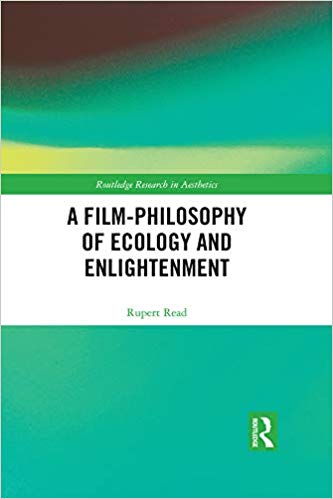
【作 者】Rupert Read
【馆藏地】理科馆外教中心(东)
【索书号】B83 /R284 /E
【简 介】Inspired by the philosophy of Wittgenstein and his idea that the purpose of real philosophical thinking is not to discover something new, but to show in a strikingly different light what is already there, this book provides philosophical readings of a number of ‘arthouse’ and Hollywood films. Each chapter contains a discussion of two films―one explored in greater detail and the other analyzed as a minor key which reveals the possibility for the book's ideas to be applied across different films, registers, and genres. The readings are not only interpretive, but they offer a way of thinking and feeling about, with, and through films which is genuinely transformative. Rupert Read’s main contention is that certain films can bring about a change in how we see the world. He advocates an ecological approach to film-philosophy analysis, arguing that film can re-shape the viewer’s relationship to the environment and other living beings. The transformative 'wake-up call' of these films is enlightenment in its true sense. The result is a book that ambitiously aims to change, though film, how we think of ourselves and our place in the world, at a time when such change is more needed than ever before.
Time, space and capital in India : longing and belonging in an urban-industrial hinterland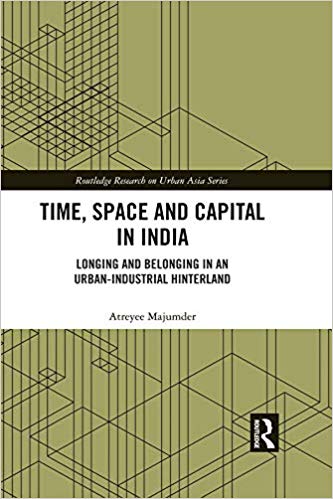
【著 者】Atreyee Majumder
【出版社】Penn State University Press; Reprint edition (February 10, 2017)
【馆藏地】理科馆理科书库
【索书号】C912.81 /M234 /E
【简 介】At this western corner of the confluence of the Bay of Bengal and the busy river Hooghly, West Bengal in eastern India lies a geography that has hosted many outsiders – traders, merchants, colonial masters, missionaries and wanderers.
This book is fundamentally concerned with the relations among the theoretical categories of time, space and capital in India and shows registers of temporality and spatiality generated by historical phases of interaction with industrial capital. Based on extensive ethnographic fieldwork in Howrah, the author examines the form of urbanism that is not linked to the city-form of spatial organization, a "hinterland urbanism". The book brings out the theoretical implications by showing the relations among time, space and capital. Through a series of encounters and interceptions with a number of voices arising, the book sheds light on the issue and identifies the state of an ethnographer who is ensconced in the field – in wonder, conceit and sometimes physical discomfort. This book is, thus, an exploration of such historical layering of space by forces of time and speed afforded by the logics of capital, through limited acts of witnessing of production and access of historical sensation.
An invitation to scholars and students of cultural anthropology to consider the question of scale in the making of ethical, political, and aesthetic selves, this book is an intervention in political anthropology that connects aesthetics, desire, and emotion to political imagination and action. The book makes a significant contribution in anthropology of space, urban anthropology and anthropology of capital as well as urban studies.
The perfect weapon : war, sabotage, and fear in the cyber age  【作 者】David E. Sanger
【作 者】David E. Sanger
【出版社】 Crown Publishing Group (NY)
【馆藏地】理科馆外教中心阅览室
【索书号】D815.5 /S225 /E(HF)
【简 介】In 2015, Russian hackers tunneled deep into the computer systems of the Democratic National Committee, and the subsequent leaks of the emails they stole may have changed the course of American democracy. But to see the DNC hacks as Trump-centric is to miss the bigger, more important story: Within that same year, the Russians not only had broken into networks at the White House, the State Department, and the Joint Chiefs of Staff, but had placed implants in American electrical and nuclear plants that could give them the power to switch off vast swaths of the country. This was the culmination of a decade of escalating digital sabotage among the world’s powers, in which Americans became the collateral damage as China, Iran, North Korea, and Russia battled in cyberspace to undercut one another in daily just-short-of-war conflict.
The Perfect Weapon is the startling inside story of how the rise of cyberweapons transformed geopolitics like nothing since the invention of the atomic bomb. Cheap to acquire, easy to deny, and usable for a variety of malicious purposes—from crippling infrastructure to sowing discord and doubt—cyber is now the weapon of choice for democracies, dictators, and terrorists. Two presidents—Bush and Obama—drew first blood with Operation Olympic Games, which used malicious code to blow up Iran’s nuclear centrifuges, and yet America proved remarkably unprepared when its own weapons were stolen from its arsenal and, during President Trump’s first year, turned back on the US and its allies. The government was often paralyzed, unable to threaten the use of cyberweapons because America was so vulnerable to crippling attacks on its own networks of banks, utilities, and government agencies.
Moving from the White House Situation Room to the dens of Chinese government hackers to the boardrooms of Silicon Valley, New York Times national security correspondent David Sanger—who broke the story of Olympic Games in his previous book—reveals a world coming face-to-face with the perils of technological revolution. The Perfect Weapon is the dramatic story of how great and small powers alike slipped into a new era of constant sabotage, misinformation, and fear, in which everyone is a target.
Neoliberalisms in British politics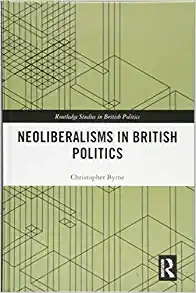
【作 者】Andrew Linklater
【出版社】Routledge; 1
【馆藏地】理科馆理科书库
【索书号】D756.1 /B995 /E
【简 介】 Taking a chronological approach, this book challenges established economistic and ideologistic narratives of neoliberalism in Britain by charting the gradual diffusion of an increasingly interventionist neoliberal governmental rationality in British politics since the late 1970s, and the various means by which the project has furnished itself with a hegemonic basis for its popular support.
Spanning five decades of British political history and drawing on rich empirical evidence to bring conceptual clarity to, and chart the effects of, a style of government bound up with a host of epochal changes, it concludes by considering Brexit and the rise of Corbynism as the final act in the neoliberal saga. It then poses the question, Is British politics on the verge of a major reconstruction representing a decisive rejection of neoliberalism?
This book will be of key interest to scholars and students of British politics and neoliberalism, liberalism and, more broadly to political theory, political economy and public policy.
The Lost History of Liberalism: From Ancient Rome to the Twenty-First Century
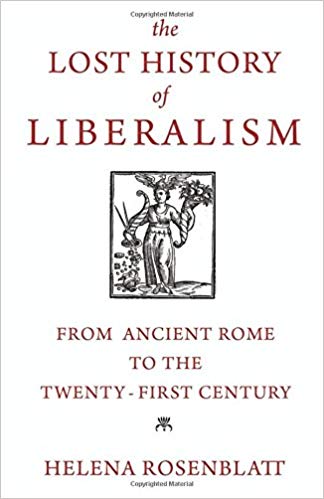 【著 者】Helena Rosenblatt
【著 者】Helena Rosenblatt
【出版社】Princeton University Press
【馆藏地】理科馆理科书库
【索书号】D09 /R813 /E
【简 介】The Lost History of Liberalism challenges our most basic assumptions about a political creed that has become a rallying cry―and a term of derision―in today’s increasingly divided public square. Taking readers from ancient Rome to today, Helena Rosenblatt traces the evolution of the words “liberal” and “liberalism,” revealing the heated debates that have taken place over their meaning.
In this timely and provocative book, Rosenblatt debunks the popular myth of liberalism as a uniquely Anglo-American tradition centered on individual rights. She shows that it was the French Revolution that gave birth to liberalism and Germans who transformed it. Only in the mid-twentieth century did the concept become widely known in the United States―and then, as now, its meaning was hotly debated. Liberals were originally moralists at heart. They believed in the power of religion to reform society, emphasized the sanctity of the family, and never spoke of rights without speaking of duties. It was only during the Cold War and America’s growing world hegemony that liberalism was refashioned into an American ideology focused so strongly on individual freedoms.
Today, we still can’t seem to agree on liberalism’s meaning. In the United States, a “liberal” is someone who advocates big government, while in France, big government is contrary to “liberalism.” Political debates become befuddled because of semantic and conceptual confusion. The Lost History of Liberalism sets the record straight on a core tenet of today’s political conversation and lays the foundations for a more constructive discussion about the future of liberal democracy.
Trans kids : being gendered in the twenty-first century
【作 者】Tey Meadow
【出版社】University of California Press; First
【馆藏地】理科馆理科书库
【索书号】D771.288 /M482 /E
【简 介】Trans Kids is a trenchant ethnographic and interview-based study of the first generation of families affirming and facilitating gender nonconformity in children. Earlier generations of parents sent such children for psychiatric treatment aimed at a cure, but today, many parents agree to call their children new names, allow them to wear whatever clothing they choose, and approach the state to alter the gender designation on their passports and birth certificates.
Drawing from sociology, philosophy, psychology, and sexuality studies, sociologist Tey Meadow depicts the intricate social processes that shape gender acquisition. Where once atypical gender expression was considered a failure of gender, now it is a form of gender. Engaging and rigorously argued, Trans Kids underscores the centrality of ever more particular configurations of gender in both our physical and psychological lives, and the increasing embeddedness of personal identities in social institutions.
The Great Delusion: Liberal Dreams and International Realities
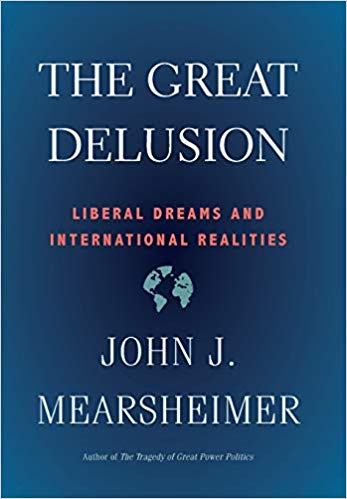 【作 者】John J. Mearsheimer.
【作 者】John J. Mearsheimer.
【出版社】Yale University Press
【馆藏地】理科馆理科书库
【索书号】D51 /M483 /E
【简 介】It is widely believed in the West that the United States should spread liberal democracy across the world, foster an open international economy, and build international institutions. The policy of remaking the world in America’s image is supposed to protect human rights, promote peace, and make the world safe for democracy. But this is not what has happened. Instead, the United States has become a highly militarized state fighting wars that undermine peace, harm human rights, and threaten liberal values at home.
In this major statement, the renowned international-relations scholar John Mearsheimer argues that liberal hegemony—the foreign policy pursued by the United States since the Cold War ended—is doomed to fail. It makes far more sense, he maintains, for Washington to adopt a more restrained foreign policy based on a sound understanding of how nationalism and realism constrain great powers abroad. The Great Delusion is a lucid and compelling work of the first importance for scholars, policymakers, and everyone interested in the future of American foreign policy.
Elusive lives : gender, autobiography, and the self in Muslim South Asia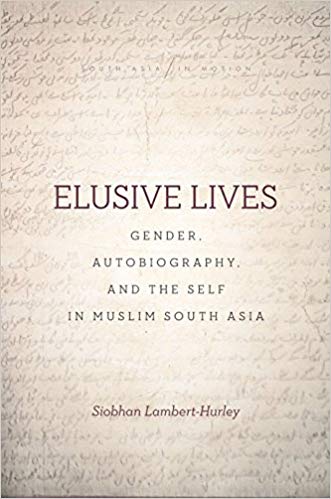
【作 者】Siobhan Lambert-Hurley
【出版社】Stanford University Press
【馆藏地】理科馆外教中心(东)
【索书号】I350.06 /L222 /E
【简 介】Muslim South Asia is widely characterized as a culture that idealizes female anonymity: women's bodies are veiled and their voices silenced. Challenging these perceptions, Siobhan Lambert-Hurley highlights an elusive strand of autobiographical writing dating back several centuries that offers a new lens through which to study notions of selfhood. In Elusive Lives, she locates the voices of Muslim women who rejected taboos against women speaking out, by telling their life stories in written autobiography. To chart patterns across time and space, materials dated from the sixteenth century to the present are drawn from across South Asia – including present-day India, Pakistan and Bangladesh. Lambert-Hurley uses many rare autobiographical texts in a wide array of languages, including Urdu, English, Hindi, Bengali, Gujarati, Marathi, Punjabi and Malayalam to elaborate a theoretical model for gender, autobiography, and the self beyond the usual Euro-American frame. In doing so, she works toward a new, globalized history of the field. Ultimately, Elusive Lives points to the sheer diversity of Muslim women's lives and life stories, offering a unique window into a history of the everyday against a backdrop of imperialism, reformism, nationalism and feminism.
Vanity fair and the celestial city : dissenting, methodist, and evangelical literary culture in England 1720-1800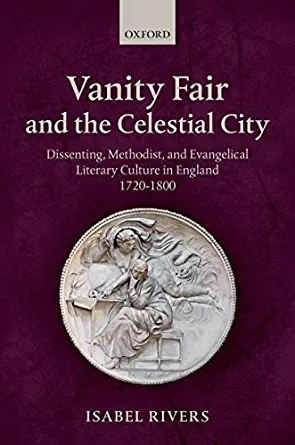
【作 者】Isabel Rivers
【出版社】OUP Oxford
【馆藏地】理科馆外教中心(东)
【索书号】I106.99 /R622 /E
【简 介】In John Bunyan's The Pilgrim's Progress, the pilgrims cannot reach the Celestial City without passing through Vanity Fair, where everything is bought and sold. In recent years there has been much analysis of commerce and consumption in Britain during the long eighteenth century, and of the dramatic expansion of popular publishing. Similarly, much has been written on the extraordinary effects of the evangelical revivals of the eighteenth century in Britain,
Europe, and North America. But how did popular religious culture and the world of print interact? It is now known that religious works formed the greater part of the publishing market for most of the century. What religious books were read, and how? Who chose them? How did they get into people's hands?
Vanity Fair and the Celestial City is the first book to answer these questions in detail. It explores the works written, edited, abridged, and promoted by evangelical dissenters, Methodists both Arminian and Calvinist, and Church of England evangelicals in the period 1720 to 1800. Isabel Rivers also looks back to earlier sources and forward to the continued republication of many of these works well into the nineteenth century. The first part is concerned with the publishing and
distribution of religious books by commercial booksellers and not-for-profit religious societies, and the means by which readers obtained them and how they responded to what they read. The second part shows that some of the most important publications were new versions of earlier nonconformist, episcopalian, Roman
Catholic, and North American works. The third part explores the main literary kinds, including annotated bibles, devotional guides, exemplary lives, and hymns. Building on many years' research into the religious literature of the period, Rivers discusses over two hundred writers and provides detailed case studies of popular and influential works.
Blind spot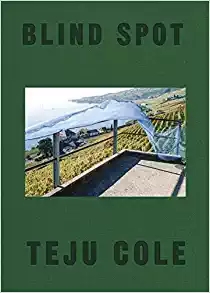
【作 者】Mari Fitzduff
【出版社】Random House; 1st Edition
【馆藏地】理科馆外教中心阅览室
【索书号】J416 /C689 /E(HF)
【简 介】In this innovative synthesis of words and images, the award-winning author of Open City and photography critic for The New York Times Magazine combines two of his great passions.
When it comes to Teju Cole, the unexpected is not unfamiliar: He’s an acclaimed novelist, an influential essayist, and an internationally exhibited photographer. In Blind Spot, readers follow Cole’s inimitable artistic vision into the visual realm as he continues to refine the voice, eye, and intellectual obsessions that earned him such acclaim for Open City.
Here, journey through more than 150 of Cole’s full-color original photos, each accompanied by his lyrical and evocative prose, forming a multimedia diary of years of near-constant travel: from a park in Berlin to a mountain range in Switzerland, a church exterior in Lagos to a parking lot in Brooklyn; landscapes and interiors, beautiful or quotidian, that inspire Cole’s memories, fantasies, and introspections. Ships in Capri remind him of the work of writers from Homer to Edna O’Brien; a hotel room in Wannsee brings back a disturbing dream about a friend’s death; a home in Tivoli evokes a transformative period of semi-blindness, after which “the photography changed. . . . The looking changed.”
As exquisitely wrought as the work of Anne Carson or Chris Marker, Blind Spot is a testament to the art of seeing by one of the most powerful and original voices in contemporary literature.
Praise for Blind Spot
“Common things [are] made radiant by the quality of Cole’s looking. . . . In this new, luminous book, Cole shows himself to be really one of the best at seeing.”—The Guardian
“This lyrical essay in photographs paired with texts explores the mysteries of the ordinary.”—The New York Times Books Review (Editors’ Choice)
“Stunning . . . feels like the fulfillment of an intellectual project that has defined most of [Cole’s] career.”—Slate
“Dazzling . . . cerebral yet intimate . . . combines personal essay, history, biography, journalism, and photography into a seamless package, capturing human dignity and grace through careful, clear-eyed reverence.”—Vice
“An eclectically brilliant distillation of what photography can do, and why it remains an important art form.”—San Francisco Chronicle

